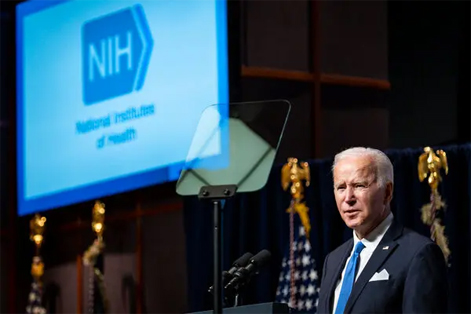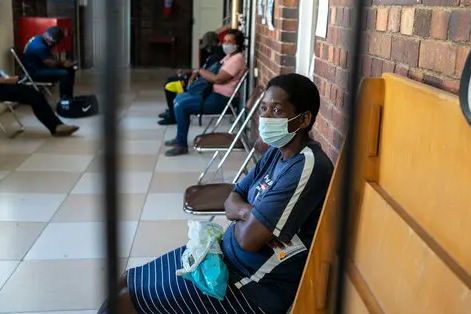|
Health
officials
still
don’t
know if
the
currently
approved
vaccines
protect
against
omicron,
but
there is
reason
to
believe
that the
shots
will
provide
some
level of
protection. |
|
|
|
|
|
 |
 |
 |
|
|
|
|
|
|
 |
|
|
President
Biden
presented
a new
strategy
for
tamping
down the
spread
of the
coronavirus
on
Thursday,
encouraging
all
adults
to get a
booster
shot and
seeking
to
expand
testing.
(Credit...Pete
Marovich
for The
New York
Times) |
| |
U.S.
health
officials
brace
for
community
spread
as
Omicron
reaches
more
states
With
cases of
the
Omicron
variant
now
recorded
from New
York to
Hawaii,
health
officials
across
the
United
States
say that
community
spread
of the
virus is
inevitable,
with one
case
already
traveling
from an
anime
convention
in New
York
City to
Minnesota.
President
Biden is
confronting
the
worrisome
new
variant
with a
strategy
that
encourages
boosters
for all
adults,
and aims
to
expand
testing
availability
and
improve
its
affordability,
plans
laid out
in a
speech
from the
National
Institutes
of
Health
on
Thursday.
Within
hours,
additional
cases of
Omicron
were
being
reported
in all
corners
of the
country.
Officials
announced
that New
York
State
had
confirmed
its
first
five
cases of
the
variant:
a
67-year-old
woman in
Suffolk
County
who
returned
from
South
Africa;
two
residents
of
Queens;
one
resident
of
Brooklyn;
and
another
person
in New
York
City who
had
traveled
recently.
The
vaccination
status
of most
of the
individuals
remained
unknown.
Another
case was
identified
in a
vaccinated
man from
Minnesota
who had
recently
traveled
to New
York
City for
an anime
convention
at the
Javits
Center
in
Midtown
Manhattan,
which
hosted
53,000
attendees
over
three
days.
Officials
immediately
urged
all
convention
participants
to get
tested.
Leaders
in
Minnesota
credited
robust
disease
surveillance
systems
for
finding
the
case.
“This
news is
concerning,
but it
is not a
surprise,”
Gov. Tim
Walz
said in
a
statement.
“We know
that
this
virus is
highly
infectious
and
moves
quickly
throughout
the
world.
Minnesotans
know
what to
do to
keep
each
other
safe now
— get
the
vaccine,
get
tested,
wear a
mask
indoors
and get
a
booster.”
A
vaccinated
Colorado
resident
who had
recently
returned
from
southern
Africa
was that
state’s
first
confirmed
case. An
additional
case in
California
— the
first
being in
San
Francisco
on
Wednesday
— was
announced
in Los
Angeles
county.
The
infected
person
had been
vaccinated
and had
traveled
to South
Africa
in
November.
But
an Oahu
resident
with no
history
of
travel
is the
first
Omicron
case in
Hawaii.
“This is
a case
of
community
spread,”
the
state’s
department
of
health
said in
a news
release.
The
individual
had
previously
been
infected
with the
coronavirus
but was
never
vaccinated.
At a
rare
joint
news
conference
on
Thursday,
Gov.
Kathy
Hochul
of New
York and
Mayor
Bill de
Blasio
of New
York
City
urged
residents
not to
panic in
light of
the
confirmed
Omicron
cases,
and
recommended
booster
shots
for
eligible
people.
They
said it
was too
soon to
know how
much of
a threat
the
variant
might
pose to
the
state.
“We’re
not
defenseless
against
this
variant
at all,”
Ms.
Hochul
said,
adding,
“We’re
not
having
shutdowns.
We’re
not
changing
our
protocols.”
Still,
Mr. de
Blasio
said he
expected
to see
more
Omicron
cases
detected
in the
coming
days:
“We have
to
assume
there’s
community
spread.”
The
variant
has
prompted
concern
among
scientists
and
public
health
officials
because
of an
unusually
high
number
of
mutations.
But it
will be
weeks,
at the
least,
before
scientists
can say
with
confidence
whether
it is
more
contagious
(early
evidence
suggests
it is),
whether
it
causes
more
serious
illness
and how
it
responds
to
vaccines.
A
preliminary
study in
South
Africa
shows a
sudden,
sharp
rise in
re-infections
as
Omicron
spreads.

The
recovery
area in
a
vaccine
clinic
in a
suburb
of
Johannesburg.
(Credit...Joao
Silva/The
New York
Times)
A
past
coronavirus
infection
appears
to give
little
immunity
to the
new
Omicron
variant
rippling
across
the
globe,
South
African
scientists
warned
on
Thursday,
potentially
tearing
away one
layer of
defense
that
humanity
has won
slowly
and at
immense
cost.
Just
a week
after
its
existence
was
revealed
to the
world,
the
heavily
mutated
variant,
which
scientists
fear
could be
the most
contagious
one yet,
is
already
by far
the
dominant
form of
the
virus in
South
Africa
and
spreading
fast,
according
to
officials
there.
Top
European
disease
experts
said
Thursday
that it
could be
the
dominant
form in
Europe
within
months.
Scientists
in South
Africa
have
reported
a
sudden,
sharp
rise
last
month in
coronavirus
cases
among
people
in that
country
who had
already
been
infected,
in a
study
that has
not yet
been
reviewed
and
published
by a
scientific
journal.
The
authors
noted
that
there
was no
such
upswing
when the
Beta and
Delta
variants
emerged.
They
did not
say how
many of
those
reinfections
could be
attributed
to
Omicron,
but
South
Africa’s
National
Institute
for
Communicable
Diseases
reported
on
Wednesday
that
when it
conducted
a
genetic
analysis
on a
sampling
of
coronavirus-positive
test
results
from
November,
almost
three-quarters
were the
new
variant.
“Population-level
evidence
suggests
that the
Omicron
variant
is
associated
with
substantial
ability
to evade
immunity
from
prior
infection,”
the
authors
of the
unpublished
study
wrote.
In
an
online
briefing
held by
the
World
Health
Organization’s
regional
office
for
Africa,
South
African
scientists
presented
a
blunter
version
of the
same
conclusion,
simply
based on
the
country’s
raw
numbers:
About 40
percent
of South
Africans
have had
the
coronavirus
and
about 30
percent
have
been at
least
partially
vaccinated
(though
there is
no doubt
some
overlap),
and yet
the
number
of new
cases is
soaring.
“We
believe
that
previous
infection
does not
provide
them
protection
from
infection
due to
Omicron,”
said
Anne von
Gottberg,
a
microbiologist
at the
communicable
disease
institute.
South
Africa
has the
world’s
fastest-growing
caseload,
though
the
figures
are
small
compared
with
those in
many
other
countries.
In the
first
half of
November,
it was
averaging
about
260 new
reported
cases a
day. On
Tuesday,
the
figure
was over
4,300,
the
highest
in
months.
It
jumped
to more
than
8,600 on
Wednesday,
and to
more
than
11,500
on
Thursday.
Scientists
say that
the
number
and type
of
changes
suggest
that
Omicron
is much
more
transmissible
than
earlier
forms of
the
virus,
though
solid
proof of
that is
still
lacking.
As
countries
around
the
world
have
raced to
implement
new
travel
rules,
with
some
barring
fliers
from
southern
Africa,
experts
say
those
measures
could
have a
limited
effect
if not
accompanied
by other
steps,
including
expanding
vaccinations,
wearing
masks
and
social
distancing.
“Border
control
can
reduce
the risk
of
importation
and can
buy
time,”
Dr.
Takeshi
Kasai,
the
World
Health
Organization’s
regional
director
for the
western
Pacific
told an
online
news
conference
on
Friday.
“But
it’s not
possible
to
completely
stop the
virus
unless
you
completely
close
the
border,
which
has a
significant
impact.”
Botswana’s
leader
says
foreign
diplomats
who
traveled
from
Europe
were
among
the
first
known
Omicron
cases.
Some
of the
first
cases of
the
Omicron
variant
of the
coronavirus
to be
detected
in
Botswana
— which
were
among
the
first
known in
the
world —
were in
foreign
diplomats
who had
traveled
to the
country
from
Europe,
the
country’s
president
said.
President
Mokgweetsi
Masisi
told CNN
on
Thursday
that
four
diplomats
who
tested
positive
for the
coronavirus
on Nov.
11, and
who were
later
found to
be
carrying
the new
variant,
“came
from a
number
of
countries.”
He
added:
“Yes,
some had
been to
Europe,
and some
had been
elsewhere.”
He did
not
offer
more
details.
On
Sunday,
Botswana’s
health
minister,
Edwin
Dikoloti,
said
that
most of
the 19
Omicron
cases
that
have
been
detected
in his
country
were
“imported.”
Until
now,
Botswana
had not
disclosed
the
nationalities
or other
details
of the
four
diplomats,
with
officials
saying
that
they
wanted
to avoid
stigmatizing
other
nations.
The
president’s
comments
highlight
that
scientists
still
cannot
say with
certainty
where
the
variant
originated.
Last
week,
after
Botswana
and
South
Africa
became
the
first
countries
to
identify
the
variant,
many
Western
nations,
including
the
United
States,
closed
their
borders
to
travelers
from
southern
Africa.
It was
sometimes
called
the
“Botswana
variant,”
before
the
World
Health
Organization
last
Friday
labeled
it a
“variant
of
concern”
and
named it
Omicron.
Mr.
Masisi
described
the
travel
bans as
“irresponsible,”
saying
that
those
nations
were
experiencing
far
worse
coronavirus
outbreaks
than
Botswana.
With
Omicron
infections
now
detected
in more
than 40
countries,
he
added,
Western
nations
could
not say
for
certain
how many
cases of
the
variant
were
already
“in your
own
backyard.”
Instead,
he said,
rich
countries
should
have
focused
on
ensuring
a more
equitable
distribution
of Covid
vaccines,
particularly
to
Africa,
which
has the
lowest
vaccination
rate of
any
continent.
“Why
does it
take
this to
drive
the
point
home,
that no
one is
safe
until we
are all
availed
the
vaccines?”
he said.
In
an
earlier
statement,
the
government
said
that
scientists
in
Botswana
had
detected
the new
variant
after
testing
four
diplomats
who
entered
the
country
on Nov.
7. They
tested
positive
for the
coronavirus
on Nov.
11, and
genetic
sequencing
confirmed
on Nov.
24 that
they
were
carrying
the
variant.
By
then,
officials
have
said,
the
diplomats
had
returned
to their
home
countries.
—
Lynsey
Chutel
|
|
|
|
|
|
|
|
|